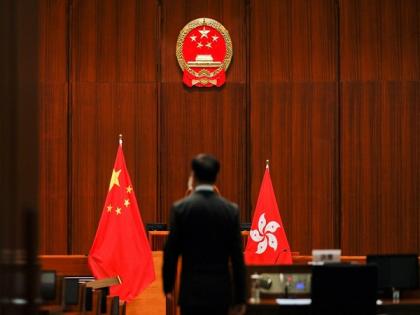Oath-taking ceremony of newly elected members of Hong Kong Legislative Council begins
By ANI | Published: January 3, 2022 10:58 AM2022-01-03T10:58:45+5:302022-01-03T11:05:02+5:30
The oath-taking ceremony for 90 members of the seventh-term Legislative Council (LegCo) of China's Hong Kong Special Administrative Region (HKSAR) began at 11:00 am local time Monday. The election eroded the democratic elements of Hong Kong's electoral system.

Oath-taking ceremony of newly elected members of Hong Kong Legislative Council begins
The oath-taking ceremony for 90 members of the seventh-term Legislative Council (LegCo) of China's Hong Kong Special Administrative Region (HKSAR) began at 11:00 am local time Monday. The election eroded the democratic elements of Hong Kong's electoral system.
The ceremony took place at the Chamber of the LegCo Complex. The lawmakers, one by one, began to take an oath to uphold the Basic Law of the HKSAR and swear allegiance to the HKSAR after jointly singing the national anthem of China together with HKSAR Chief Executive Carrie Lam, the oath administrator, reported Xinhua.
This year's Legislative Council elections marked a sobering milestone in the Chinese government's dismantling of Hong Kong's democracy, freedoms and autonomy.
The elections were the first to take place since the changes made under the 'patriot' electoral reform law; changes that have slashed the number of directly contested seats and required candidates to be screened by government officials.
Moreover, Hong Kong "patriots only" elections witnessed a record low voter turnout as pro-government candidates swept into the expanded legislature.
Around 1.3 million voters cast ballots for a 30.2 per cent voter turnout - 5.6 percentage points less than the last historic low in the 1995 legislative election under British colonial rule, Hong Kong Free Press reported.
Turnout is a central issue, as observers consider it a barometer of legitimacy in an election where pro-democracy candidates are largely absent.
The elections were also the first since the passage of the National Security Law in June 2020, since which all of Hong Kong's major opposition leaders are now in jail or exile.
Under the electoral shake-up, the proportion of directly elected seats was reduced from approximately half to less than a quarter or 20 seats.
Forty seats were selected by a committee stacked with Beijing loyalists, while the remaining 30 were filled by professional and business sectors such as finance and engineering, known as functional constituencies, reported Al Jazeera.
The latest results show that almost all of the seats have been taken by pro-Beijing and pro-establishment candidates.
The US, Canada, the UK, Australia, New Zealand expressed grave concerns over the erosion of democratic elements of the Special Administrative Region's electoral system.
( With inputs from ANI )
Disclaimer: This post has been auto-published from an agency feed without any modifications to the text and has not been reviewed by an editor
Open in app